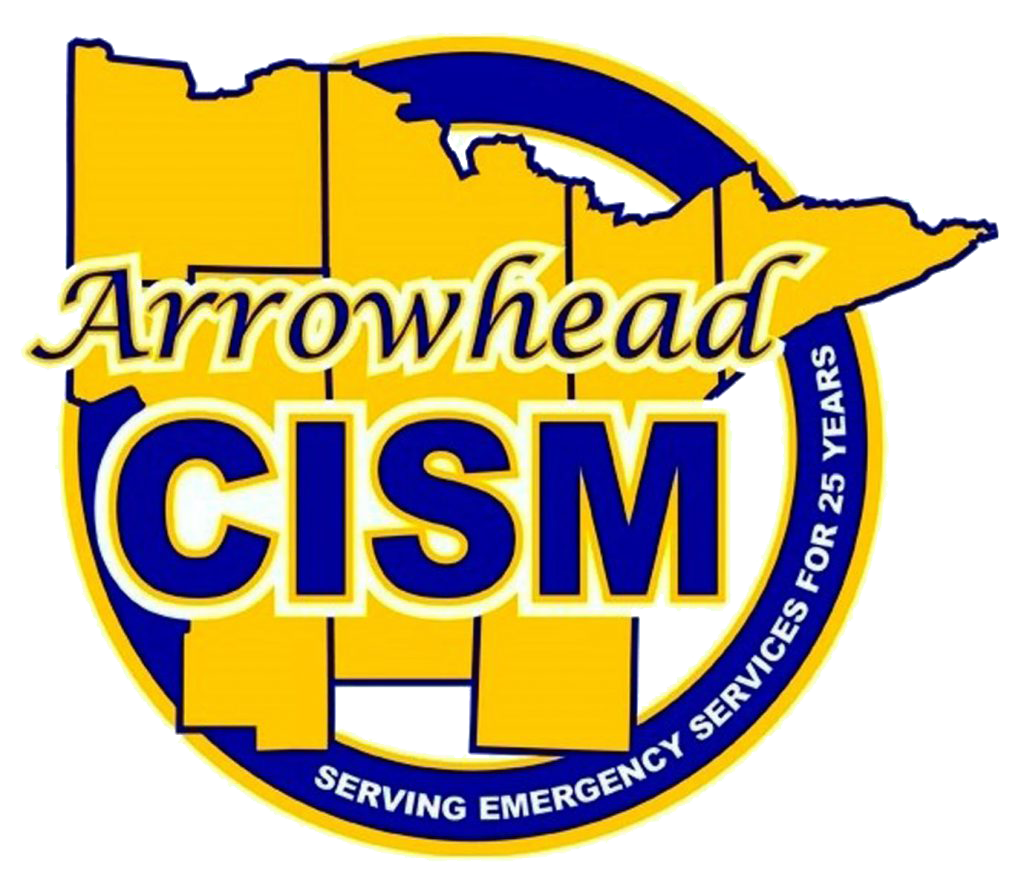Arrowhead CISM Team
Critical Incident Stress Management
Taking care of the people in emergency services since 1990
To request a debriefing, defusing or CMB following a critical incident or event, contact the St. Louis County Emergency Communications center. This number is answered 24/7. They will put you in touch with the CISM Team.
218-625-3581
Emergency Service Personnel deal with a variety of unique and sometimes daily stressors within their career and personal lives. For the most part, they are readily able to cope with and bounce back after a challenging response. There are occasional “critical incidents” that can be physically and emotionally demanding or disruptive and have a lasting impact. In those cases, utilizing critical incident stress management (CISM) resources can be valuable in lessening the impact and speeding recovery for responders and their agency.
The Arrowhead CISM Team is composed of both mental health professionals and experienced emergency service peers from many disciplines. Our Team specializes in providing support to emergency service personnel. All are volunteers specially trained with knowledge and tools to speed your recovery and normalization after emotionally and psychologically difficult events.
The Interventions that CISM uses most frequently include:
- Group stress debriefings (CISD)
- Small group or one-on-one defusings
- Crisis management briefings (CMB)
If a stress debriefing (CISD) is requested and scheduled after an event, CISM team members from appropriate disciplines are assembled to facilitate the debriefing. Only responders directly involved in the event being debriefed are appropriate and invited to attend a stress debriefing.
Confidentiality: Services provided by CISM team members, and responders who receive their support, are considered confidential. Any information or discussions are protected as private data and are non-discoverable communications protected by state statutes in both Minnesota and Wisconsin.
Since 1990, the Arrowhead CISM Team has provided hundreds of agencies and thousands of emergency personnel in our region the support needed to manage post-traumatic stress. Utilizing CISM lessens the impact of difficult events and provides healthier responders to our communities.
To Request Services from the Arrowhead CISM Team following a difficult event:
218-625-3581
This is a non-emergency number answered 24/7 by the St. Louis County Emergency Communications Center.
They will put you in touch with the CISM Team.
Critical Incidents and Life-Changing Events
Emergency services personnel, whether paid or volunteer, encounter stressful, dangerous and unpredictable situations. They can be routinely exposed to hazardous conditions, human tragedies, or events requiring that life and death decisions be made in a matter of seconds. For the most part, responders are able to cope with these situations and move on to the next response while not recognizing the impact on them personally. They may consider these a part of the job. However, some situations result in powerful emotional, psychological or physical reactions.
Situations that are more likely to evolve into a critical incident for a responder includes:
- Child death or injury including children witnessing an event
- Suicide related
- Victim is known to or is family or coworker of responders
- Motor vehicle crash (MVC) death or severe injury
- Officer involved shooting (OIS)
- Line of Duty Death (LODD) or any death or injury of a dept. member
- Prolonged event or actively evolving
- Responder activity contributed to an injury or just feeling personally responsible
- Natural disasters or response in severe weather environments
- Severe physical trauma or unusual and challenging injury management needed
- Crime related death or injury (incl. mass shootings)
- Threats, a dangerous scene, or safety issues faced by responders
- Difficult or challenging medical or illness event
- Multiple casualty incidents (MCI)
- Dispatch and communication related challenges or stressors
- Command or inter-agency conflicts at a scene
- 1st time experience or challenge, especially for new responders
- Cumulative or multiple event build-up over a short period of time
CISM Education and Training
Programs available to emergency service personnel include teaching new skills to manage occupational stressors, developing individual resiliency or psychological body armor, learning to develop and employ stress reduction strategies, death notification skills, and awareness of spousal and family dynamics in emergency services. To request education and training for your agency, or additional information about our programs, contact: the Arrowhead EMS Association.


